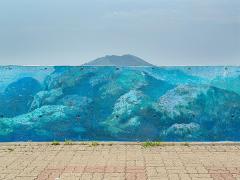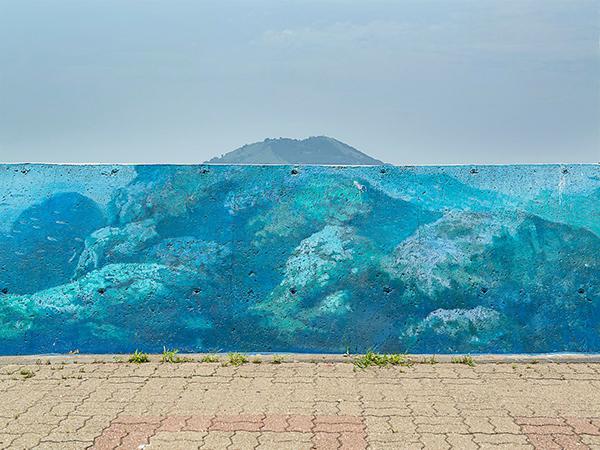นิทรรศการภาพถ่าย “Political Landscape”

นิทรรศการภาพถ่าย “Political Landscape” ผลงานโดย ยอง ฮวาน ลี (Yong Hwan Lee) จัดแสดงระหว่างวันที่ 6 สิงหาคม - 30 กันยายน 2560 ณ RMA institute : อาเอ็มเอ อินสติติว
“Political landscape”
นิทรรศการ ภาพถ่าย โดย ยอง ฮวาน ลี
จัดแสดงในวันที่ 6 สิงหาคม - 30 กันยายน 2560
เปิดนิทรรศการเวลา 18:00 น. - 22:00 น.
(ไม่เสียค่าเข้าชม)ด้วยประเภทของโฆษณาชวนเชื่อที่ถูกใช้เป็นวิธีการทางการเมือง อันมีแนวโน้มเพื่อเชิดชูความสุนทรียให้กับเมืองนั้นๆเป็นสาระสำคัญ มากไปกว่าการมีมิติที่คิดคำนึงอย่างลึกซึ้งสำหรับประชาชนที่กำลังขาดแคลนสภาพแวดล้อมที่เป็นธรรมชาติในการเป็นอยู่ อะไรคือแนวคิดที่ถูกกล่าวว่าเป็น “อุดมคติ” กำลังฉาบอยู่บนโฆษณาชวนเชื่อเหล่านั้น เพื่อปิดบังอยู่หลังภูมิทัศน์ที่ตื้นเขิน ? อะไรคือ “ชุดความคิด” ที่เป็นที่สุดของวิธีการเหล่านั้น ? คำถามและประสบการณ์เหล่านี้เป็นตัวกระตุ้นให้ ยอง ฮวาน ลี สร้างผลงาน ‘Political Landscape’ ขึ้นมา
‘ภาพในรูปแบบของ ’ภาพถ่าย’ นั้นมิได้เป็นการสร้างโลกเสมือนจริง แต่ในการรับรู้และความเข้าใจของเรา ภาพดังกล่าวนั้นคือ “ตัวแทน” ของความจริง กล่าวได้ว่า “ความจริง” นี้เป็นสิ่งที่ภาพสามารถพรรณาถึงความจริงของวัตถุหรือองค์ประกอบนั้นๆ ภาพเหล่านี้สามารถกล่าวว่าเป็นภาพเสมือนจริงได้ หากภาพนั้นกำลังปฏิบัติตัวให้เหมือนกับวัตถุนั้นๆได้ในตัวเอง มากไปกว่าการถูกใช้เป็นเพียงสัญญะหรือบทบาทที่สร้างความสับสนในกับการรับรู้ของเรา ความย้อนแย้งที่เกิดขึ้นอย่างหนึ่งก็คือการที่เรากระหายถึงความจริงและความเป็นจริงทั้งหลายในขณะที่โลกของเราเต็มไปด้วยภาพเสมือนจริงมากขึ้นทุกวัน’ นี่คือข้อความที่ ยอง ฮวาน ลี ได้อธิบายอย่างสัตย์จริง ในทุกๆครั้งที่ ยอง ฮวาน ลี ได้ได้ค้นพบทิวทัศน์ดังกล่าว ไม่ใช่เพียงที่กรุงโซล แต่ยังเกิดขึ้นทั้งในเมืองท้องถิ่นอื่นๆ หรือแม้แต่ในต่างประเทศ เขาจดบันทึกสถานที่เหล่านั้นและย้อนกลับมาเพื่อถ่ายภาพเหล่านี้อีกครั้งในภายหลัง
ในขณะที่ ยอง ฮวาน ลี พัฒนามุมมองของตัวเองให้กว้างขึ้น เขาได้จัดการกับความจริงที่ผ่านการควบคุมในภาพถ่ายที่เป็นมากกว่าภาพเสมือนจริงที่ใช้กันในงานการเมืองอย่างกล้าหาญ นี่จึงเป็นเรื่องราวการกล่าวถึงธรรมชาติที่เข้มข้นและจริงจังมากขึ้น เนื่องเพราะว่าสิ่งที่เป็นสภาวะ “เสมือนจริง” นั้นไม่มีจิตวิญญาณในตัวเอง ขณะที่ “ความจริง” มีอยู่อย่างเต็มเปี่ยม ในผลงานล่าสุดของเขา ‘Controlled Nature’ ยอง ฮวาน ลี ได้เผชิญกับธรรมชาติที่ถูกนำไปไว้ในสถานที่ที่ผิดแปลกไปจากถิ่นอาศัยเดิมของมัน ภาพของกระถางกระดอกไม้ที่ถูกวางไว้บนหัวมุมถนน ต้นไม้ที่ถูกกักขังอยู่ในตึกคอนกรีต สิ่งเหล่านี้เขานำเสนอให้ผู้ชมได้คิดว่ามีที่มาที่ไปของมันอย่างไร มิใช่เพียงมอบความหมายของเขาลงไปบนธรรมชาติเหล่านั้นเท่านั้น ‘ธรรมชาติมาจากหนใด ?’ ‘ปัจจุบันยังมีอยู่ที่ใด ? ’ มนุษย์กำลังรู้สึกเป็นหนึ่งเดียวกันในภาวะแห่งการรู้แจ้งนี้ หรือมนุษย์กำลังรู้สึกลำบากที่ถูกควบคุม ? นี่คือคำถามที่ถูกส่งต่อมายังเรา ผู้ถูกกักขังทุกคน ที่เชื่อว่าถ้ำนี้เป็นโลกทั้งใบอันกว้างขวาง
ช่างภาพเดินทางออกไปและย้อนกลับมา เขาแสดงออกและแบ่งปันประสบการณ์ ในการทำงานของช่างภาพ ผู้ที่สร้างภาพถ่ายเพื่อบอกกล่าวถึงมุมมองที่เขาได้เห็น ความรู้สึกและความนึกคิดของเขาหรือเธอแก่ผู้อื่น ยอง ฮวาน ลี เป็นหนึ่งในบุคคลเช่นนั้น ในช่วงเวลาที่เรารับรู้ผลงานควบคู่กับไปการบรรยายของตัวศิลปิน ในงานแสดงนิทรรศการเดี่ยวของเขาท่ามกลางศิลปินอื่นๆที่เมือง ดึสเซิลดอร์ฟ ประเทศเยอรมัน ในเดือนธันวามคม ปี 2557 เราเริ่มสัมผัสถึงสิ่งที่เขาชี้ออกมาให้เห็นถึงปรากฏการณ์ของความขัดแย้ง ของธรรมชาติสองอย่าง ที่กำลังถูกหยิบจับมาเทียบเคียงในสถานที่และระยะเวลาอันเป็นหนึ่งเดียวกัน หากย้อนพิจารณาถึงการทำความรู้จักตัวศิลปิน ผู้ที่ทำการศึกษาอยู่ในมหาวิทยาลัยขณะช่วงเวลาที่ไม่ราบรื่น เหตุการณ์การเปลี่ยนผ่านของระบอบการปกครองที่อยู่ในกระบวนการไปสู่ประชาธิปไตยของประเทศ ความรู้สึกของความลำบากที่เกิดจากมวลของการบังคับหรือการออกหมายกำหนดการในภาครวมใดๆ ดูเหมือนจะดำรงอยู่อย่างแทรกซึมภายในจิตใต้สำนึกของตัวศิลปิน ดังนั้นภาพถ่ายอันเป็นผลงานของ ยอง ฮวาง ลี จึงสามารถถูกมองว่าเป็น กระบวนการของการมองเห็น ถึงสภาวะอันแน่นิ่งที่อยู่ในประสบการณ์การไตร่ตรองอันเหนี่ยวนำโดยวัตถุและภูมิทัศน์ที่พบเจอในชีวิตประจำวัน
สอบถามข้อมูลเพิ่มเติมติดต่อ :
02-663-0809 (RMA Institute)
082-458-4455 (กฤตธัช)
081-490-4085 (เมืองไทย)*ที่จอดรถจำนวนจำกัด
___________________________________________________________
RMA Institute presents
‘Political Landscape’
Photography Exhibition by Yong Hwan Lee
The exhibition on 6th August - 30th September 2017
6:00pm - 10:00pm
(Free Entry)A type of propaganda that was a political compromise to improve the aesthetic features of a city rather than a careful consideration for the citizens who lack a green urban environment. What is the masked idea, namely the ideology, concealed behind such superficial landscapes? What is the “idea” that goes beyond all of them? Lee’s new body of work Political Landscape was motivated by this experience.
The images one captures with photography are not directly the virtual but are, in a sense, the representational. They can even be said to be the real as they are realistic depictions of an object. Such images can be referred to as the virtual only when they work like objects themselves, moving beyond the role of signs and creating confusion in our perception. The irony is that we come to feel more of a thirst for the real and truthful when our world is filled with more virtual images; this is the message that Lee’s expression earnestly conveys. Whenever Lee discovered such scenes not only in Seoul but also in local cities and places overseas, he recorded their locations and later revisited them to take pictures.
As he comes to develop a more extensive point of view, Lee addresses the controlled real, going beyond the virtual which has been politically exploited. This may be something more serious in nature since the virtual has no soul while the real does. In his latest work Controlled Nature Lee deals with natural objects that have been brought to some place from their original habitats. With images of a flower pot placed on a corner and a tree imprisoned in a concrete building he suggests viewers think about where they come from rather than putting out his own definition on their nature. Where does our nature come from? Where does it exist nowadays? Do we feel harmony in a state of enlightenment, or feel inconvenient in being controlled? These are questions that are asked to all of us as prisoners who believe the cave to be the entire world.
A photographer leaves and returns to show and share his experiences. That is, the photographer makes photographs to share what he or she views, feels, and thinks with others. Yong Hwan Lee is one such person. When viewing his works based on the lecture he delivered at his solo exhibition at the request of a group of media artists from Düsseldorf, Germany in December 2014, we come to recognize how he points out the phenomena of two conflicting natures being juxtaposed at the same space and time. Considering how he introduces himself as someone who attended college in a period of upheaval during the nation’s process of democratization, a sense of inconvenience caused by a forced or regulated harmony seems to dwell in his subconscious. Thus, his photographs can be seen as a visualization of his meditative experience triggered by the objects and landscapes he has come across in his daily life.
for more information :
02-663-0809 (RMA Institute)
082-458-4455 (Krittathat)
081-490-4085 (Muangthai)
*limited carpark
